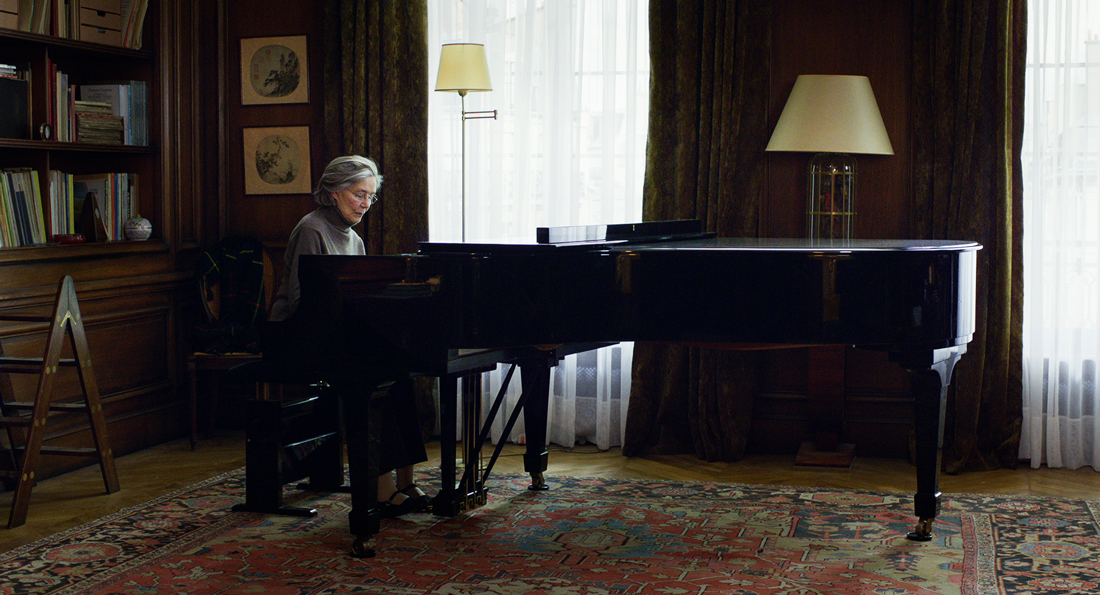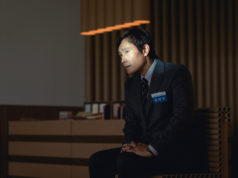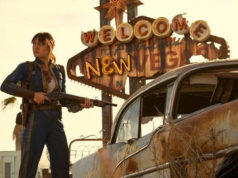Movies tend to neglect seniors as subjects. This is neither a recent phenomenon, nor is it a Hollywood thing. Filmmakers and audiences everywhere have been entranced by the passions of youth or the assurance of vigorous middle age. However, this past year some enterprising filmmakers have discovered rewarding stories to be told about older people. These include the flawed but engaging Hope Springs last summer (and arguably Skyfall) and now the two films under discussion this week.
Amour comes to us toting loads of awards and citations, including the Cannes Film Festival’s Golden Palm, which is no surprise at all, and an Oscar nomination for Best Picture, which is a big surprise. This ferociously downbeat French-language film is the sort of thing that begs to be described as “honest” and “unflinching,” as I did when I named it as one of the best movies of 2012. Well, I can do better than that at describing this masterwork, the purest and most powerful achievement by Austrian director Michael Haneke.
Like the main characters of most of Haneke’s other movies, the ones here are named Georges and Anne Laurent (Jean-Louis Trintignant and Emmanuelle Riva). They’re a longtime married couple, both retired music professors, living out their lives in a large, comfortable Parisian apartment. They’re happy together until one day when Anne suddenly becomes unresponsive during a conversation over the breakfast table. She comes back to herself after a few minutes and resists Georges’ pleas to call for a doctor, insisting that she’s fine. Then she pours her tea into her saucer instead of her teacup.
Aside from a brief dream sequence and a couple of momentary hallucinations, this is an uncommonly straightforward piece of work from Haneke. Many of his previous films use stylistic tricks to encourage us not to take the proceedings at face value: the Brechtian metadrama of Funny Games (both the original and the remake), the slippery allusions and elisions of Caché, the fable-like unreality of The White Ribbon. You’d have to go back to his 2002 study of sexual sadomasochism The Piano Teacher to find anything in his filmography that’s this simple.
The simplicity fits the material, as Anne’s initial stroke is followed by another one. Haneke proves a gimlet-eyed observer of her deterioration, stepping back to take in two technicians installing an adjustable bed, or the process of Georges helping Anne out of her wheelchair into a chair in her living room. The director does judiciously omit some details — as Georges, talking to their well-intentioned but helpless daughter (Isabelle Huppert), describes changing Anne’s diaper and preventing bed sores, saying, “These things shouldn’t be seen.” Yet Haneke does show us enough to give us a sense of the disease’s relentless progress, stripping away Anne’s personality until everything that made her who she was is gone.
He’s aided immensely by a great performance from the 85-year-old Riva, who’s best known for starring in the French New Wave classic Hiroshima, mon amour back in 1959. Portraying Anne from her initial robust physical health all the way to the last stages is impressive enough, but she also registers the blows to Anne’s dignity inflicted by the illness. With her own paralyzed right hand preventing her from playing the piano, a wounded look comes over her face as she tries to listen to a CD of Schubert’s piano music recorded by one of her pupils. Later on, after she wets the bed for the first time, she has to wait until Georges helps her into her motorized wheelchair before she can make a humiliated exit. She partners well with Trintignant (the star of such films as A Man and a Woman and The Conformist), who is indelible as he delivers Georges’ climactic monologue about an experience he had at summer camp when he was a boy. Yet it’s Riva who leaves the deeper impression here, as Anne’s losing struggle to keep hold of her faculties lights up the film.
Amour proceeds with a cold, inexorable logic, yet the movie itself isn’t cold. It’s a celebration of, yes, the love the Laurents have for each other, but also of the life that they are bursting with, as old as they are and as close to death as Anne is. That point is brought home to devastating effect in the movie’s wordless final sequence. The palpable silence — as heavy a silence as you’ve ever heard in a film — that descends on the Laurents’ apartment stands as testament to how much they’ve brought to these rooms. In Haneke’s films, what’s not on the screen is often as important as what is there, and nowhere in his body of work is the absence of something more eloquent or deeply felt than it is here. The stoicism and strength with which this 70-year-old filmmaker reckons with mortality is deeply moving.
I don’t know what I expected the first movie directed by Dustin Hoffman to look like, but I sure didn’t expect it to look like Quartet. The Oscar-winning actor has apparently been hiding a love for England and classical music throughout his lengthy career. Either that, or he’s adapting Ronald Harwood’s stage play to the screen because he’s responding to its themes of aging and regret, and he’s just faking his way through the rest of it. Whichever it is, this entry from last year’s Lone Star Film Festival isn’t a deathless piece of cinematic art, but it’s a pleasant diversion and a laudable debut.
The story takes place at Beecham House, a manorial home in the English countryside that’s serving as a retirement community for musicians. Our main characters, opera singers and former colleagues all, form a tight little circle within this world: sensible tenor Reginald Paget (Tom Courtenay) anchoring mezzo Cissy Robson (Pauline Collins), whose mind is rapidly going, and Wilf Bond (Billy Connolly — does he have to play every randy old Scotsman?), a stroke-impaired baritone who nonetheless hits on every woman who crosses his path. Their equilibrium is upset when Jean Horton (Maggie Smith), Reggie’s ex-wife and the greatest British soprano of her time, becomes the house’s newest resident.
Hoffman clearly loves the vibe of this setting, a place filled with artists who pass the time by keeping their skills honed and performing for one another because they love it. Much of the background music in this movie is provided by residents playing pieces by Bach, Verdi, Saint-Saëns, and Gilbert and Sullivan, as well as occasional music-hall favorites like “Are You Havin’ Any Fun?” Many of the denizens of Beecham House are played by actual musicians (the movie’s closing credits identify them all and outline their accomplishments), and no less a real-life opera star than Dame Gwyneth Jones portrays Jean’s main professional rival. The sense of professional camaraderie among these aged performers — especially one bit where a whole cafeteria room rises in concern as one of the residents is carried out of the building on a hospital gurney — is where the movie gets its charm.
The thin wisp of a plot hangs on whether Jean, who refuses to sing in public because she doesn’t want people to hear her diminished voice, can be convinced to help save Beecham House financially by performing in its annual fund-raising gala. Since we don’t hear this performance (largely because Smith, Courtenay, et al. can’t sing), this doesn’t give us much of a dramatic payoff. Nor does the subplot about Jean and Reggie trying to reconcile after their marriage ended so acrimoniously. The scene with Reggie connecting with a young black student (Jumayn Hunter) about how opera is like rap is a regrettable misstep, too.
Still, Hoffman directs the film smoothly and in an unhurried manner that agrees with the ambience. Maybe the most inspiring thing here is the way this 75-year-old neophyte takes to the challenge of directing. Looks like he’s not too old to take up something new.
[box_info]
Amour
Starring Emmanuelle Riva and Jean-Louis Trintignant. Written and directed by Michael Haneke. Rated R.
Quartet
Starring Maggie Smith and Tom Courtenay. Directed by Dustin Hoffman. Written by Ronald Harwood, based on his own play. Rated PG-13.
[/box_info]












